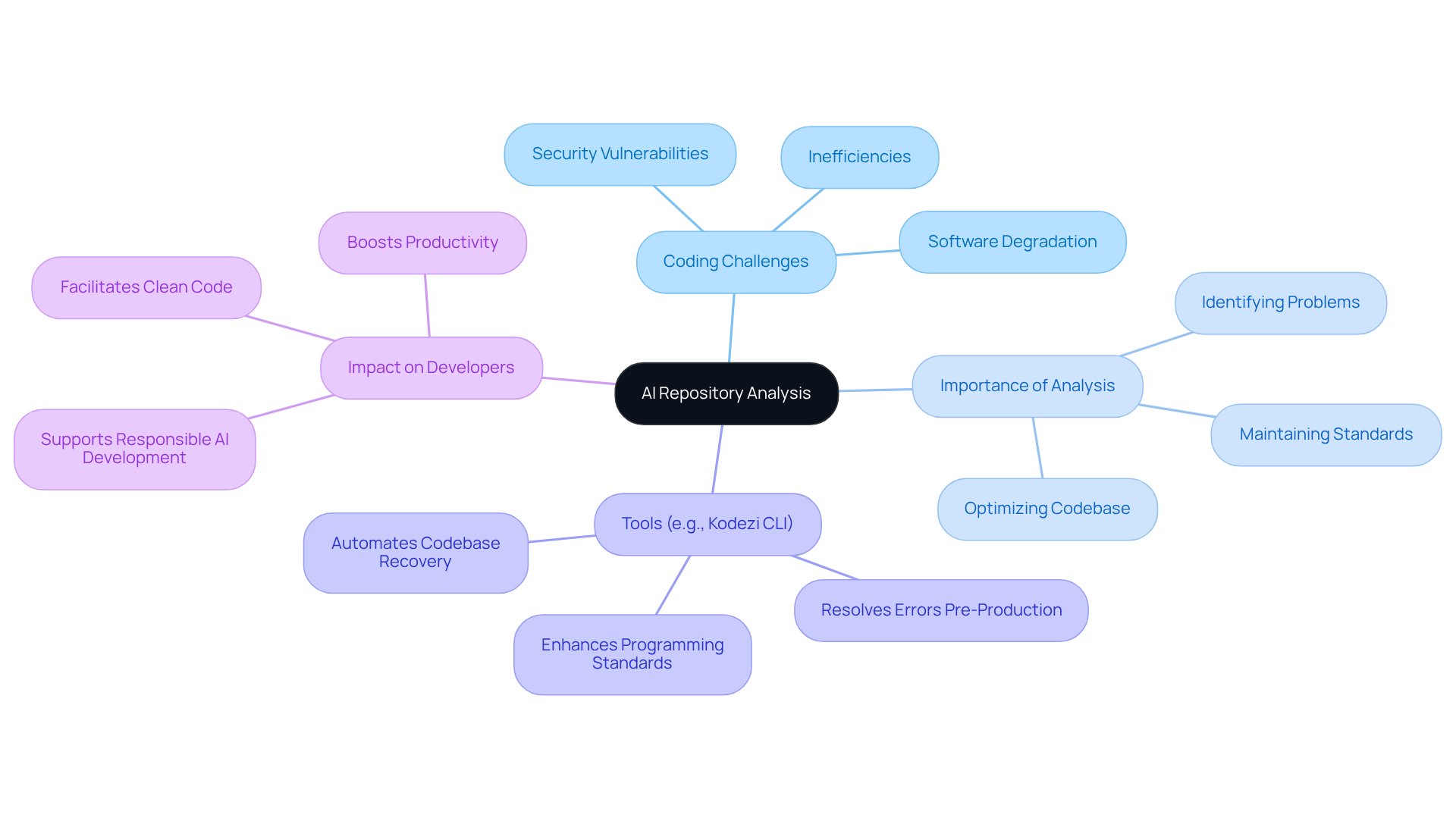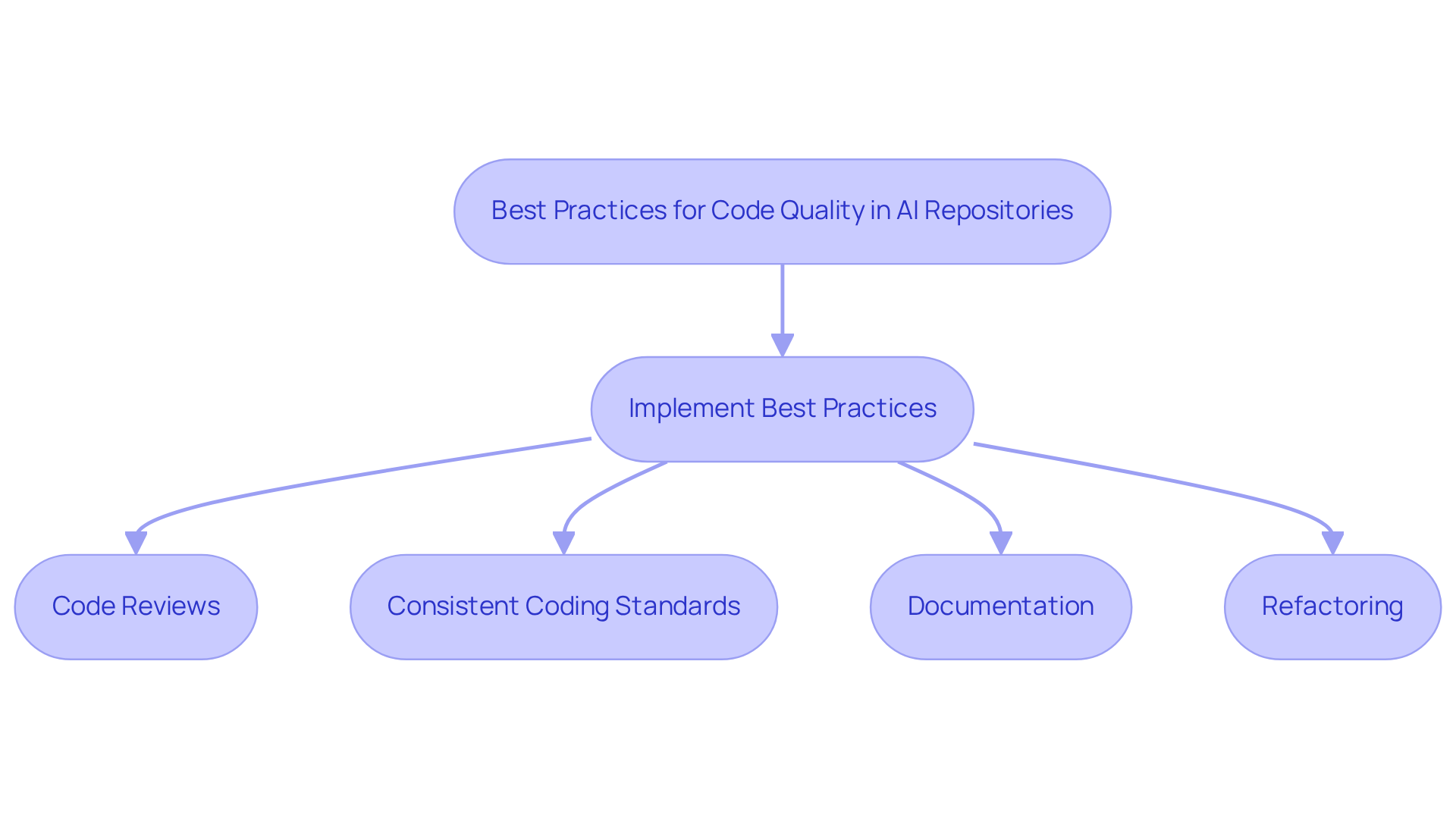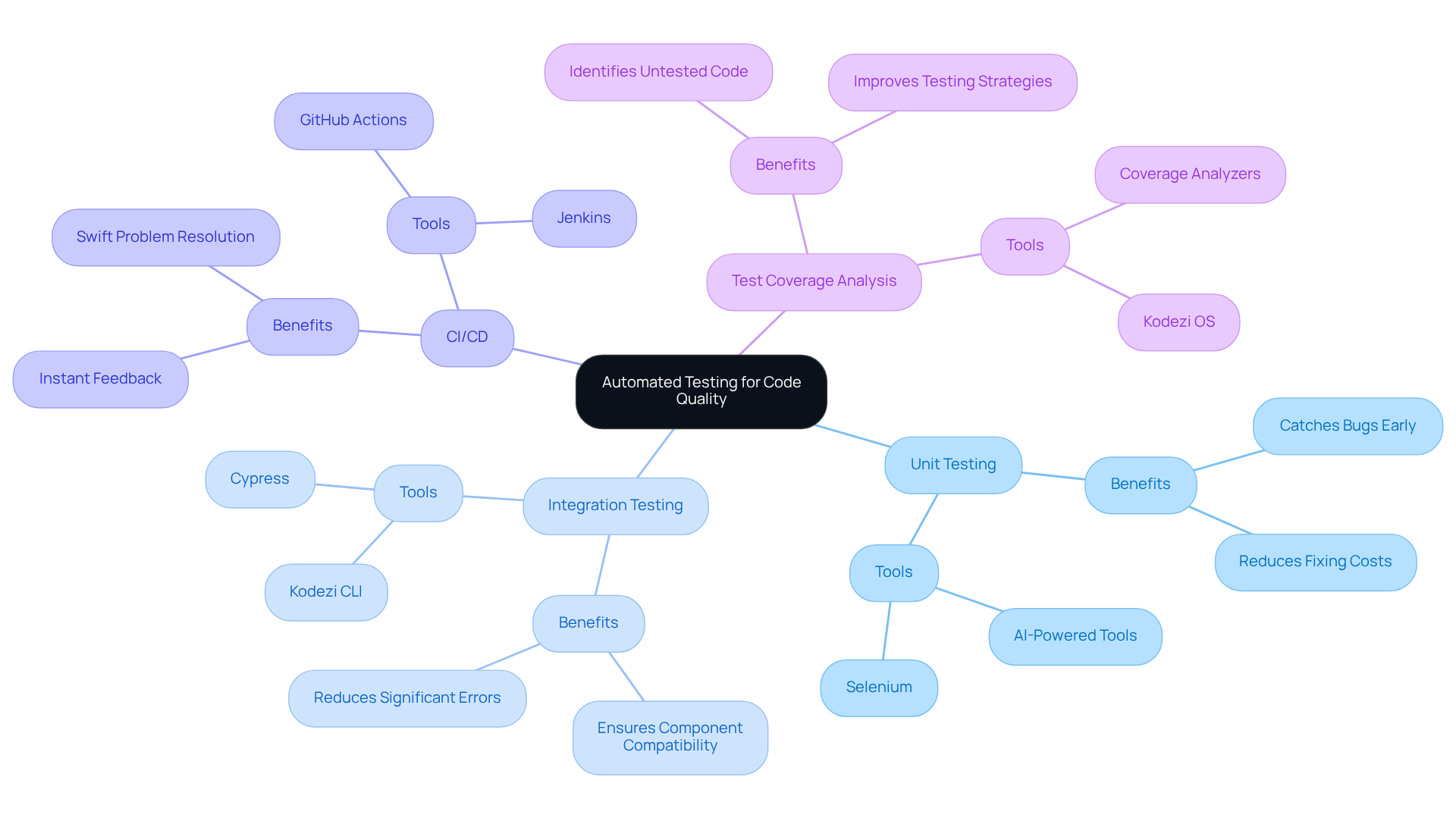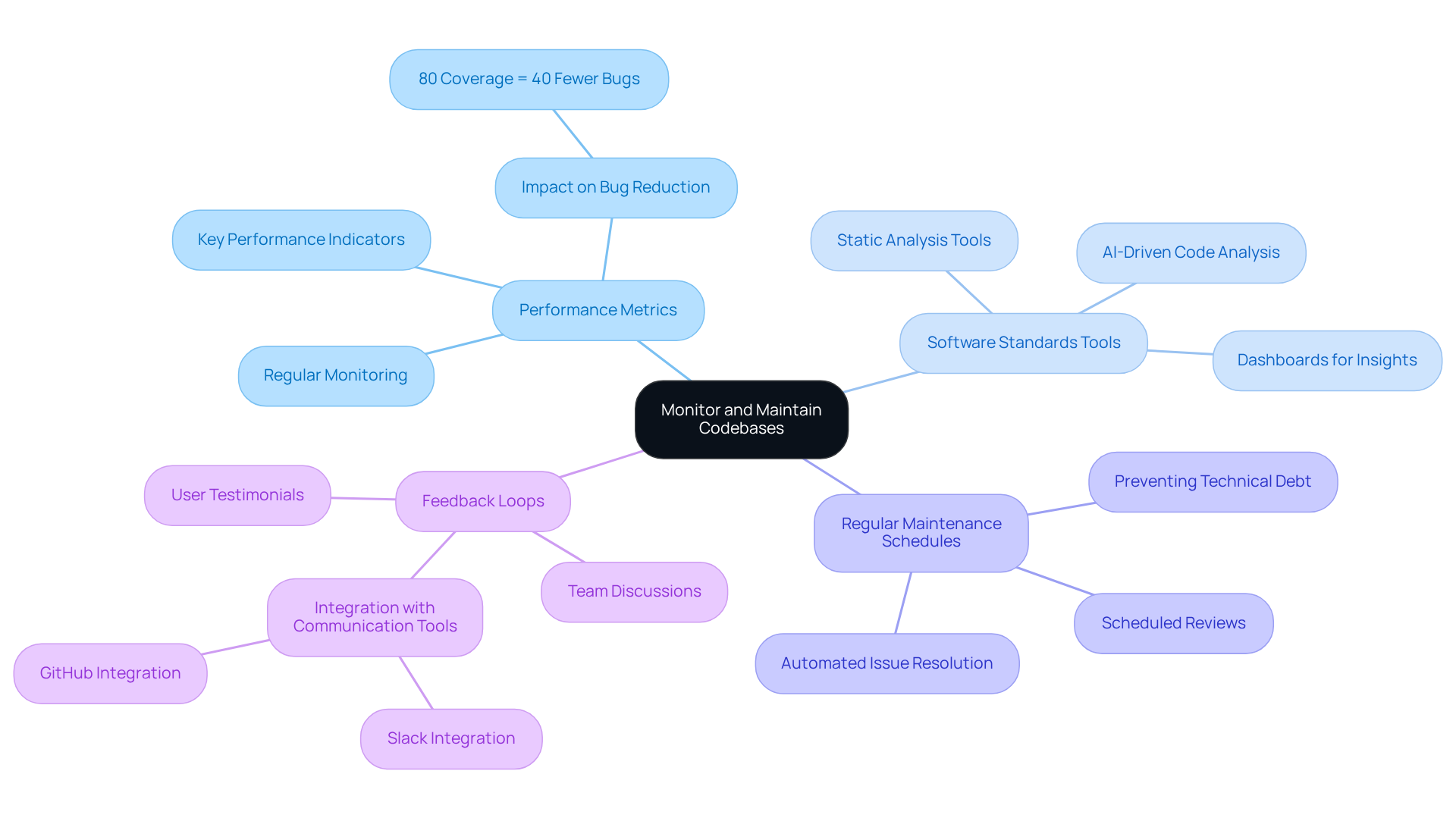Overview
Developers often face significant challenges when it comes to maintaining high standards in their coding practices. How can these challenges be effectively addressed? The article outlines four strategies for effective AI repository analysis that tackle these issues head-on. These strategies include:
- Implementing best practices for code quality
- Integrating automated testing
- Maintaining codebases for long-term efficiency
In addition, tools like Kodezi play a crucial role in enhancing productivity. By utilizing automated processes, regular monitoring, and collaborative practices, Kodezi ensures high programming standards. This leads to more reliable AI projects, allowing developers to focus on innovation rather than getting bogged down by routine tasks.
Furthermore, the benefits of using Kodezi are clear: improved productivity and elevated code quality. Imagine being able to streamline your coding process and produce higher-quality outputs with less effort. Why wouldn’t you explore the tools available on this platform?
Ultimately, adopting these strategies not only enhances individual performance but also contributes to the overall success of AI projects. By leveraging Kodezi, developers can navigate coding challenges more effectively, ensuring they remain at the forefront of technological advancements.
Introduction
In the fast-paced realm of artificial intelligence, coding challenges can significantly impact project outcomes. As developers face these complexities, the importance of AI repository analysis becomes evident as a crucial element in ensuring software quality and security. This article explores effective strategies that not only enhance coding practices but also protect against potential pitfalls in AI development.
How can teams effectively manage repositories while upholding high standards? Addressing this question unveils actionable insights that can transform the approach organizations take towards their AI initiatives.
Understand AI Repository Analysis and Its Importance
Coding challenges are a common hurdle developers face in the rapidly evolving AI landscape. An essential procedure in AI projects is the AI repository analysis, which involves scrutinizing the structure, dependencies, and performance of programming. This analysis is crucial for identifying potential problems such as software degradation, security vulnerabilities, and inefficiencies that can hinder project success. For instance, regular audits can uncover outdated dependencies or unused scripts, allowing teams to optimize their codebase efficiently.
How can Kodezi help in overcoming these challenges? By employing tools such as Kodezi CLI, which independently enhances programming standards and resolves errors prior to production, teams can significantly boost their development productivity. With nearly 72% of businesses adopting AI for at least one function, the reliance on effective repository management is more significant than ever. Furthermore, the recent Executive Order on AI underscores the necessity for responsible AI development, emphasizing the importance of upholding programming standards and security in AI initiatives.
What does this mean for developers? Effective repository management is crucial, especially considering that AI advancements could potentially displace 400 million workers worldwide. A comprehensive understanding of AI repository analysis is essential for achieving optimal code quality in AI projects, as it lays the groundwork for maintaining clean, compliant, and production-ready codebases. The CLI exemplifies a versatile solution that addresses these challenges directly, allowing enterprise developers to automate codebase recovery and improve overall productivity.
Are you ready to enhance your coding practices? For those interested, a 5-minute quickstart is available, and you can also see a demo to explore Kodezi CLI's capabilities.

Implement Best Practices for Code Quality in AI Repositories
In the realm of AI development, maintaining high code quality presents significant challenges for teams. To address these challenges effectively, implementing best practices is essential. Kodezi offers a suite of features designed to enhance code quality and team productivity.
Code Reviews: Regular peer evaluations are crucial for identifying issues early and facilitating knowledge exchange among team members. By fostering an environment of positive feedback, teams not only improve programming quality but also promote collaboration and accountability. Research indicates that evaluations conducted by multiple reviewers are more effective at uncovering security issues, underscoring the value of diverse perspectives in the review process. Additionally, Kodezi's automated review features provide insights and recommendations, further enriching the review experience.
Consistent Coding Standards: Establishing consistent coding standards is vital for ensuring uniformity across the codebase, which simplifies both readability and maintenance. Tools like linters can automate compliance with these standards, ensuring all team members adhere to the same guidelines and minimizing errors. Kodezi's AI-driven tools enhance this process by automatically detecting deviations from programming standards, thereby elevating overall quality. Notably, a significant number of modified lines can extend review time while reducing message count, highlighting the need for manageable changes to boost review efficiency.
Documentation: Keeping documentation up to date is essential for onboarding new members and aiding current ones in navigating the codebase effectively. Automated documentation tools streamline this process, ensuring that documentation reflects the latest programming updates and practices, thereby enhancing overall team productivity. Kodezi's capabilities in generating OpenAPI specifications and Swagger UI for API documentation significantly contribute to maintaining current documentation, which is crucial for effective team collaboration.
Refactoring: Regularly restructuring the program to enhance its architecture without changing its functionality is key to reducing complexity and improving maintainability. This practice not only helps manage technical debt but also ensures that the codebase remains adaptable to future changes and innovations. Kodezi's automated debugging features empower teams to quickly identify and resolve performance bottlenecks and security vulnerabilities, enhancing the efficiency of the refactoring process. Furthermore, the platform's automated builds and testing features improve the overall development workflow by catching bugs early, ensuring the codebase remains robust and reliable.
By embracing these best practices and leveraging tools like Kodezi, teams can establish a strong framework that fosters continuous software excellence through AI repository analysis in their projects. This ultimately leads to the development of more reliable and maintainable applications.

Integrate Automated Testing for Continuous Code Quality Assurance
Incorporating automated testing into the development process is crucial for maintaining continuous software standards. Developers often encounter challenges in ensuring code quality and efficiency. How can these challenges be effectively addressed? Here are key strategies to implement:
-
Unit Testing: Develop unit tests for individual components to verify their functionality. This practice helps catch bugs early in the development cycle, significantly reducing the cost of fixing issues later. Indeed, 90% of companies believe test automation is vital for digital transformation, emphasizing its crucial role in preserving software quality. The AI-powered tools enhance unit testing by automatically analyzing and correcting code, functioning as an autocorrect for programming.
-
Integration Testing: Ensure that different components of the application work together as expected by implementing integration tests. This is particularly important in AI projects where multiple systems interact, and any misalignment can lead to significant errors. Kodezi CLI autonomously improves codebases and fixes bugs before they reach production, ensuring that integration tests yield reliable results. Experts observe that 'Implementing the appropriate automation approach not only enhances efficiency and precision but also guarantees that software products are delivered more quickly and with greater standards.'
-
Continuous Integration/Continuous Deployment (CI/CD): Utilize CI/CD pipelines to automate the testing process. This permits instantaneous feedback on programming alterations, guaranteeing that any problems are recognized and resolved swiftly. The CLI enhances CI/CD automation by detecting and correcting issues prior to code being pushed, which is essential for sustaining high code quality. At present, 77% of businesses have embraced automated software testing, highlighting its significance in contemporary development methods and corresponding with Kodezi's services.
-
Test Coverage Analysis: Regularly analyze test coverage to identify untested parts of the codebase. Tools such as coverage analyzers can assist groups in understanding which areas require more testing. By utilizing solutions such as Kodezi OS, which consistently observes codebases and independently resolves issues, groups can improve their testing strategies and uphold high standards.
By implementing these automated testing approaches, groups can maintain high programming standards and reduce the chance of defects in their AI repository analysis efforts. Explore the tools available on the Kodezi platform to enhance your development process and achieve greater productivity.

Monitor and Maintain Codebases for Long-Term Efficiency
In the evolving landscape of AI development, teams face common hurdles such as coding challenges that can be addressed through AI repository analysis. To ensure long-term efficiency in AI codebases, an AI repository analysis and a robust monitoring and maintenance strategy are essential.
Performance Metrics: Regularly monitoring key performance metrics is crucial for identifying areas for improvement. This includes tracking response times, resource usage, and error rates. Did you know that projects achieving over 80% programming coverage report up to 40% fewer bugs? This statistic underscores the vital role of performance metrics in maintaining software standards. Kodezi OS facilitates this by consistently overseeing software environments, ensuring extensive programming coverage is upheld and enhancing scripts through its AI functionalities.
Software Standards Tools: Employing tools that provide insights into software standards, such as static analysis instruments and dashboards, can significantly aid teams in recognizing potential issues before they escalate. The integration of AI-driven code analysis tools, such as those utilized in AI repository analysis, greatly enhances the detection of coding issues. This results in cleaner, more manageable codebases, thanks to functionalities like bug fixing and test correction, which are crucial for groups aiming to elevate their code quality.
Regular Maintenance Schedules: Establishing a routine for codebase maintenance, including scheduled reviews and updates, is a proactive approach that helps prevent the accumulation of technical debt. The operating system automates this process by autonomously identifying and resolving issues, highlighting the importance of regular maintenance to mitigate risks. Research indicates that having six or more technical debt smells can lead to a significant increase in bug occurrences, making autonomous solutions essential for B2B engineering groups.
Feedback Loops: Establishing feedback loops with colleagues to discuss code quality and maintenance issues encourages a culture of continuous improvement. How often do you engage in these discussions? The operating system enhances communication and updates among teams via its integration with tools like Slack and GitHub, ensuring that all members are aligned on best practices. User testimonials reveal that Kodezi has transformed debugging and boosted productivity for over 1,000,000 users, ultimately enhancing the overall health of the codebase.
By implementing these strategies, teams can maintain healthy, efficient codebases that support the long-term success of their AI projects, aided by AI repository analysis. Explore the tools available on the Kodezi platform to elevate your coding practices today.

Conclusion
Effective AI repository analysis is crucial for success in the AI development landscape. Developers often face coding challenges that can hinder their project outcomes. By understanding the significance of repository analysis, they can tackle these issues head-on. This analysis identifies potential problems, such as software degradation and security vulnerabilities, while optimizing codebases to ensure they remain clean, compliant, and production-ready.
Key strategies for achieving high code quality in AI repositories include:
- Implementing rigorous code reviews
- Establishing consistent coding standards
- Maintaining thorough documentation
- Engaging in regular refactoring
These practices, complemented by automated testing techniques like unit and integration testing, create a robust framework that enhances collaboration and accountability among team members. Furthermore, continuous monitoring of performance metrics and the integration of AI-driven tools empower teams to maintain efficiency and proactively address technical debt.
In summary, embracing these best practices and leveraging tools like Kodezi can significantly elevate the quality and maintainability of AI projects. As reliance on AI grows, the importance of effective repository management becomes even more pronounced. By committing to these strategies, developers can improve their coding practices and contribute to the long-term success of their AI initiatives. Engaging with these methodologies today will pave the way for a more efficient, secure, and innovative future in AI development.
Frequently Asked Questions
What is AI repository analysis?
AI repository analysis involves scrutinizing the structure, dependencies, and performance of programming within AI projects to identify potential issues such as software degradation, security vulnerabilities, and inefficiencies.
Why is AI repository analysis important?
It is crucial for identifying and resolving problems that can hinder project success, such as outdated dependencies or unused scripts, thereby allowing teams to optimize their codebase efficiently.
How can Kodezi assist developers with AI repository analysis?
Kodezi offers tools like Kodezi CLI, which enhances programming standards and resolves errors before production, helping teams boost their development productivity significantly.
What is the significance of effective repository management in the current AI landscape?
With nearly 72% of businesses adopting AI for at least one function, effective repository management is essential for ensuring clean, compliant, and production-ready codebases, especially in light of the recent Executive Order on AI emphasizing responsible development.
What are the implications of AI advancements for developers?
Developers must focus on effective repository management to maintain optimal code quality, as AI advancements could potentially displace up to 400 million workers worldwide.
What solutions does Kodezi CLI provide for developers?
Kodezi CLI automates codebase recovery and helps improve overall productivity, addressing common challenges faced in AI repository analysis.
Is there a way to learn more about Kodezi CLI?
Yes, there is a 5-minute quickstart available, and a demo can be seen to explore Kodezi CLI's capabilities.




